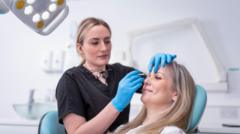Could Fake Botox Be Behind Over 30 Poisonings?

Understanding the Risks of Botulism from Cosmetic Procedures
In recent weeks, a concerning rise in botulism cases linked to cosmetic procedures has been reported in England. The UK Health Security Agency (UKHSA) noted that thirty-eight cases of botulism poisoning have emerged, raising alarms about the use of unlicensed Botox-like products. This article delves into the dangers associated with botulinum toxin, the symptoms of botulism, and essential precautions that individuals should take when considering cosmetic treatments.
What is Botulism?
Botulism is a rare yet potentially fatal condition caused by toxins produced by the bacterium Clostridium botulinum. The toxin interferes with nerve function, leading to paralysis and, in severe cases, respiratory failure. Though botulism is infrequent, its effects can be dire, making awareness and prevention crucial.
Types of Botulism
There are several types of botulism, each with different causes:
- Foodborne Botulism: Caused by consuming improperly preserved or canned foods containing the botulinum toxin.
- Wound Botulism: Occurs when the bacteria enter the body through a wound and produce toxins.
- Infant Botulism: Happens when infants ingest spores of the bacteria, which then produce toxins in their intestines.
- Adult Intestinal Colonization Botulism: Similar to infant botulism but occurs in adults with certain gastrointestinal conditions.
In the context of cosmetic procedures, the most concerning type is related to the administration of botulinum toxin through injections, often for aesthetic purposes.
The Cosmetic Use of Botulinum Toxin
Botulinum toxin, commonly known as Botox, is widely used in the beauty industry to reduce facial lines and wrinkles. When administered in small, regulated doses, Botox can temporarily paralyze specific muscles, leading to a smoother appearance. However, when used improperly or when unlicensed products are involved, the risks of complications increase significantly.
Symptoms of Botulism
The symptoms of botulism can manifest as early as a few hours or as late as four weeks after exposure. Key symptoms to watch for include:
- Difficulties in swallowing
- Slurred speech
- Respiratory difficulties requiring support
- Droopy eyelids
- Double vision
- Weak or paralyzed facial muscles
These symptoms can escalate quickly, requiring immediate medical attention. If you suspect you may be experiencing these symptoms, contacting NHS 111 is crucial.
Recent Cases in England
The recent outbreak of botulism cases in England has primarily been concentrated in the East, East Midlands, and North East regions. The UKHSA has indicated that the clinics involved have likely used unlicensed Botox-like products, which significantly heightens the risk of botulism. Patients in these cases reported severe symptoms, underscoring the importance of using licensed products and qualified practitioners.
Precautions When Considering Cosmetic Treatments
To protect yourself from the dangers associated with botulinum toxin, the UKHSA recommends several precautions:
1. Verify Practitioner Credentials
Always ensure that the practitioner administering Botox is qualified and registered with a recognized regulatory body. Ask for their credentials and proof of their qualifications.
2. Check Product Licensing
Inquire whether the Botox product being used is licensed for use in the UK. Only products approved by the Medicines & Healthcare products Regulatory Agency (MHRA) should be administered.
3. Request Detailed Information
Before undergoing any procedure, request information about the specific product being used, including its brand name and intended dosage. Confirm these details again on the day of your treatment.
4. Ensure Proper Prescription
A legitimate prescription for Botox should be in the patient's name. Confirm that the practitioner has followed proper protocols in prescribing the medication.
5. Be Cautious of Discounts
Be wary of clinics offering Botox at significantly discounted rates, as this may indicate the use of unregulated products. Quality often comes at a price, and safety should be your priority.
6. Report Concerns
If you suspect that you or someone else is experiencing symptoms related to botulism after a cosmetic procedure, seek immediate medical help and report your concerns to health authorities.
The Importance of Awareness and Education
As the popularity of cosmetic procedures continues to grow, so does the need for heightened awareness about the potential risks involved. Patients must educate themselves about the products being used and the qualifications of their practitioners. Awareness can significantly reduce the risk of adverse effects, including botulism.
Industry Regulations and Standards
Regulatory bodies like the MHRA play a critical role in ensuring that botulinum toxin products meet safety and quality standards. Their guidance emphasizes the importance of obtaining Botox through licensed healthcare professionals, as unregulated products can lead to severe health risks.
Conclusion
The recent outbreak of botulism cases linked to unlicensed cosmetic procedures serves as a stark reminder of the importance of safety in aesthetic treatments. By being informed and vigilant, individuals can protect themselves from the potential dangers of botulinum toxin. Always prioritize qualifications, product safety, and proper protocols when considering cosmetic treatments.
Ultimately, ensuring your safety should be your top priority. Are you prepared to take the necessary steps to safeguard yourself when considering cosmetic procedures? Stay informed and prioritize your health.
Frequently Asked Questions
What is botulism and how can it occur during cosmetic procedures?
Botulism is caused by toxins from Clostridium botulinum bacteria. It can occur during cosmetic procedures if unlicensed or improperly handled botulinum toxin is used.
What are the symptoms of botulism?
Symptoms include difficulty swallowing, slurred speech, respiratory distress, droopy eyelids, double vision, and weak facial muscles. Immediate medical attention is necessary if these symptoms arise.
How can I ensure my Botox treatment is safe?
Verify the practitioner's qualifications, ensure the product is licensed, request detailed information about the treatment, and confirm that a proper prescription is in place.
What should I do if I suspect botulism after a cosmetic procedure?
If you experience symptoms of botulism, contact the NHS 111 service immediately for guidance and assistance.
As you consider your options for cosmetic treatments, what steps will you take to ensure your safety? #BotulismAwareness #CosmeticSafety #HealthFirst
Published: 2025-07-18 16:42:10 | Category: technology



